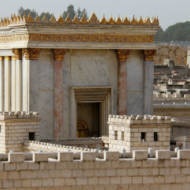
It is little known that the Holy Temple in Jerusalem is alluded to in the Passover Haggadah, along with the lesson that it will be rebuilt when unity prevails.
The Passover Seder both begins and ends with a prayer that we merit to live in the rebuilt Land of Israel. Included in this prayer is the rebuilding of the Holy Temple in Jerusalem, where we will one day, once again, sacrifice the Passover offering and perform the Passover Seder as truly required. It is only with the Holy Temple that we will once again be able to offer the Passover sacrifice.
We are told that the Temple was destroyed due to rampant hatred and disunity among the Jewish people. It seems, therefore, that rampant love and acts of kindness would lead to the rebuilding of the Temple. So the question is asked: Why do we not make mention of the Temple during the Passover Seder, and what can be done to rebuild it?
The answer, it is explained, is that there actually IS mention of the Temple, albeit hidden. It’s included in the Four Questions of the Ma Nishtana, one of which is: “Why is it that on all other nights we don’t even dip once, and on this night we dip twice?”
We are told that these two dippings of the Seder night allude to important historical lessons that will lead to the rebuilding of the Temple.
The first dipping (the vegetable into salt water) is intended to correspond to the dipping of Joseph’s coat into blood by his brothers after they sold him. Of course, the act of Joseph’s brothers throwing him into a pit and selling him is a perfect example of rampant hatred. Unfortunately, this type of hatred continues to some extent to this very day.
The second dipping (the bitter herbs into the charoset) is intended to correspond to the dipping of the hyssop into blood at the time of the Exodus. As it says, “And you shall take the bundle of hyssop and dip it into the blood.” This verse also refers to the Passover offering as the hyssop was dipped into the blood of the first Passover offering. The people dipped the hyssop into the blood of the sacrifice and put the blood on their doorposts so that the Angel of Death would pass over their homes during the plague of the firstborn.
The bundle of hyssop is called an “aguda” in in the Torah. The word aguda also means “unity.” As such, the “dipping of unity” which took place right before the Exodus was a remedy of sorts for the first “dipping” of baseless hatred so many years earlier, which caused descent and slavery in Egypt. This symbolizes that we will one day be redeemed from the current exile through aguda – unity and harmony.
By: Rabbi Ari Enkin, Rabbinic Director, United with Israel
Send Passover Food Packages to Israeli Soldiers
We are honored to thank the young men and women of the IDF who risk their lives to protect the citizens of Israel. Join us in sending Passover food packages (and personal notes) to Israeli soldiers and their families.
Bring Passover joy and blessing to the heroes of Israel who defend our freedom every day!
Many soldiers spend the Passover holiday with needy families back home. The soldiers greatly appreciate your love and concern.
Click Here to Send Your Care Package and Personal Note to Israeli Soldiers
Source: United with Israel


